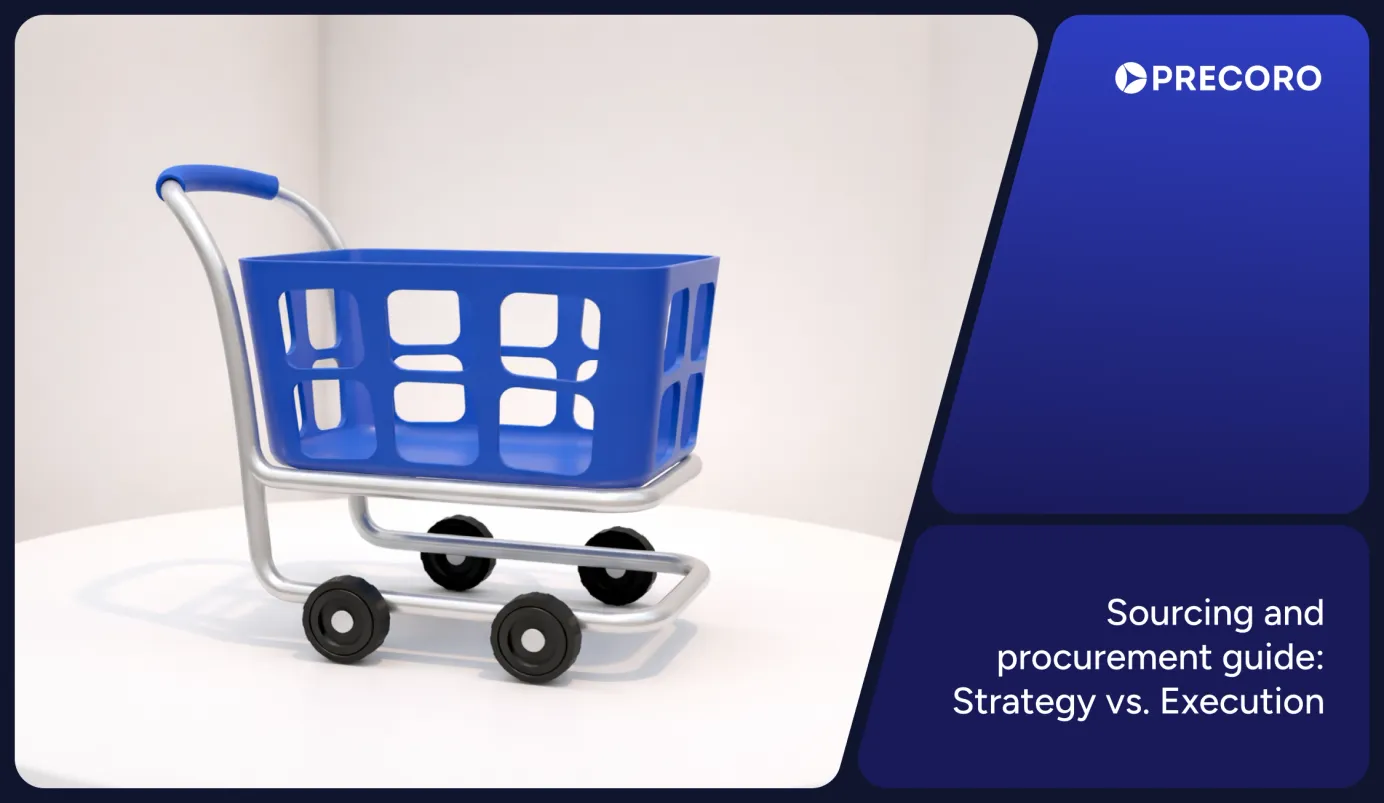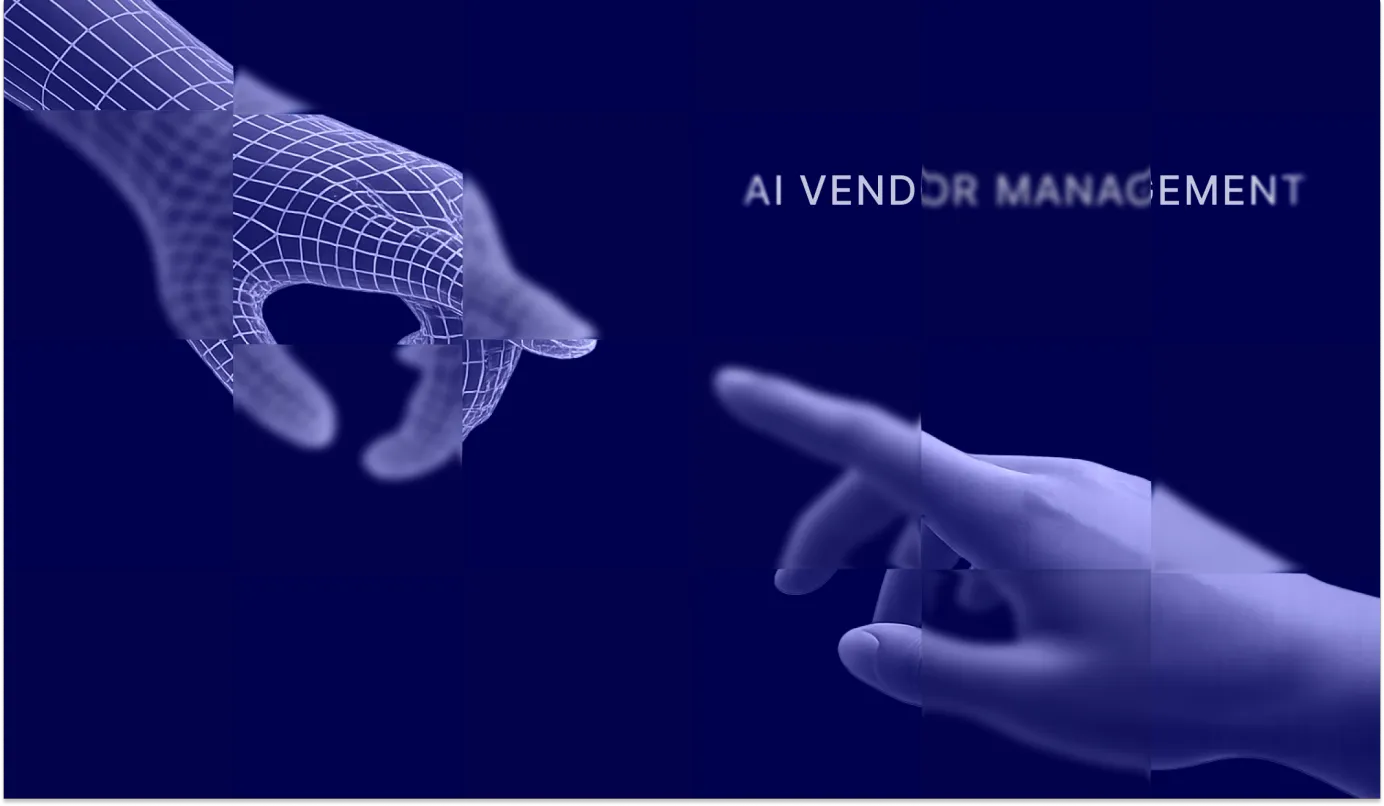
11 min read
Chief Procurement Officer (CPO) — Meaning and Their Role in Procurement
The chief procurement officer is absolutely vital for maintaining efficiency in an organization’s spending. Read about the CPO’s responsibilities, the role they play in procurement, and the ideal skill set for the job.
A Chief Procurement Officer (CPO) is a senior executive responsible for overseeing an organization's sourcing, purchasing, and supply chain strategy. The role focuses on driving cost savings, managing risk, fostering innovation, and aligning procurement activities with broader business objectives. CPOs lead the entire procure-to-pay lifecycle, while ensuring efficiency and compliance.
Success in this role requires strong leadership, negotiation, and analytical skills, as well as the ability to adapt to global market shifts, manage complex stakeholder relationships, and leverage technologies such as digital procurement.
Keep reading to find out more about the CPO:
- What the job of chief procurement officer encompasses
- What role do CPOs play in the company’s procurement process
- Which companies employ CPOs
- Which skills make one a good CPO
The Job of Chief Procurement Officers
The job of the chief procurement officer is constantly evolving as organizations become more global and complex. In the past, CPOs were mainly responsible for negotiating contracts with suppliers and overseeing purchasing operations, but today, the CPO contributes to developing a company’s long-term procurement strategy, often using new technologies that have emerged to facilitate procurement projects.
Modern businesses recognize the strategic value of procurement in achieving operational efficiency and a competitive advantage, so the CPO’s role has gained prominence. Today, CPOs work closely with department representatives and other c-level execs to understand business objectives and align procurement activities with these objectives.
The chief procurement officer’s workload extends beyond timely purchases and cost-saving measures. It encompasses a wide range of strategic, operational, and leadership tasks, including but not necessarily limited to the following.
Strategic procurement planning
The CPO is responsible for developing strategic objectives of procurement. This task involves close communication with the organization’s management in order to understand business priorities and needs. The CPO can then forecast procurement needs and develop an efficient purchasing plan. AI-powered systems can help with analyzing historical data to create accurate plans. The ultimate goal here is to make sure that the procurement department’s activities are aligned with the general business strategy.
Strategic sourcing
Supply chain management is another component of the CPO's job description. As part of this, this individual defines supplier criteria, analyzes the global supply market, and identifies suppliers that offer the best quality materials, products, or services within an established price range and under acceptable terms and conditions. The CPO can delegate specific supply chain management and planning processes to selected employees, but as a manager, the CPO bears responsibility for the results.
Operational management
The chief procurement officer cooperates with the finance and procurement teams and leads development of procurement workflows. This person also approves specific steps for the source-to-pay process and assigns responsible employees. The CPO then oversees implementation of these workflows and assists the team if there are any issues or inconsistencies.
Budgeting
Working closely with the chief financial officer is an important part of the CPO’s role; together they estimate expected expenses and allocate finances to the appropriate budgets. Depending on the company’s size and needs, there can be one general procurement budget, or it can be further subdivided for different departments or projects.
Supplier relationship management
The chief procurement officer is also responsible for maintaining strong relationships with key vendors and supplies on behalf of the company. This includes establishing trustworthy and convenient communication channels, agreeing on regular performance reviews, facilitating feedback sessions, and introducing transparent contract management principles.
The CPO can also promote long-term cooperation with suppliers, which helps negotiate favorable contract terms and special offers. In general, the chief procurement officer acts on behalf of the company to build business partner relationships in which suppliers would be inspired to continuously improve the quality of provided services and products and implement product innovations.
Risk management
The chief procurement officer is responsible for identifying possible risks associated with procurement processes and preparing mitigation strategies. Depending on the company’s industry, size, structure, and ownership model, such risks can range from external supply chain disruptions to internal operational issues. In some cases, a dedicated risk manager is in charge of risk management instead, with the CPO overseeing their work and ensuring that relevant practices are implemented into sourcing and procurement processes.
Ensuring compliance
Another of the chief procurement officer’s responsibilities is to ensure the company’s adherence to procurement laws and regulations issued at the national or international level. In addition to this, the CPO oversees internal operations to ensure that employees comply with company policies at every step of the procurement process. Both external and internal compliance principles are crucial to maintaining the company's reputation and avoiding legal issues or financial losses.
Monitoring performance
The CPO measures procurement performance against selected key performance indicators (KPIs) to notice unsettling tendencies in time and identify areas for improving the procurement process. Regular performance monitoring also highlights the strong sides of the company’s procurement function, signaling which practices can be reinforced.
Reporting to stakeholders
Chief procurement officer serves as a link between the purchasing department and the company’s stakeholders. CPO conducts regular assessments of the established procurement process and reports on its effectiveness. Stakeholders who are kept in the loop can then initiate any changes if the company’s business objectives change.
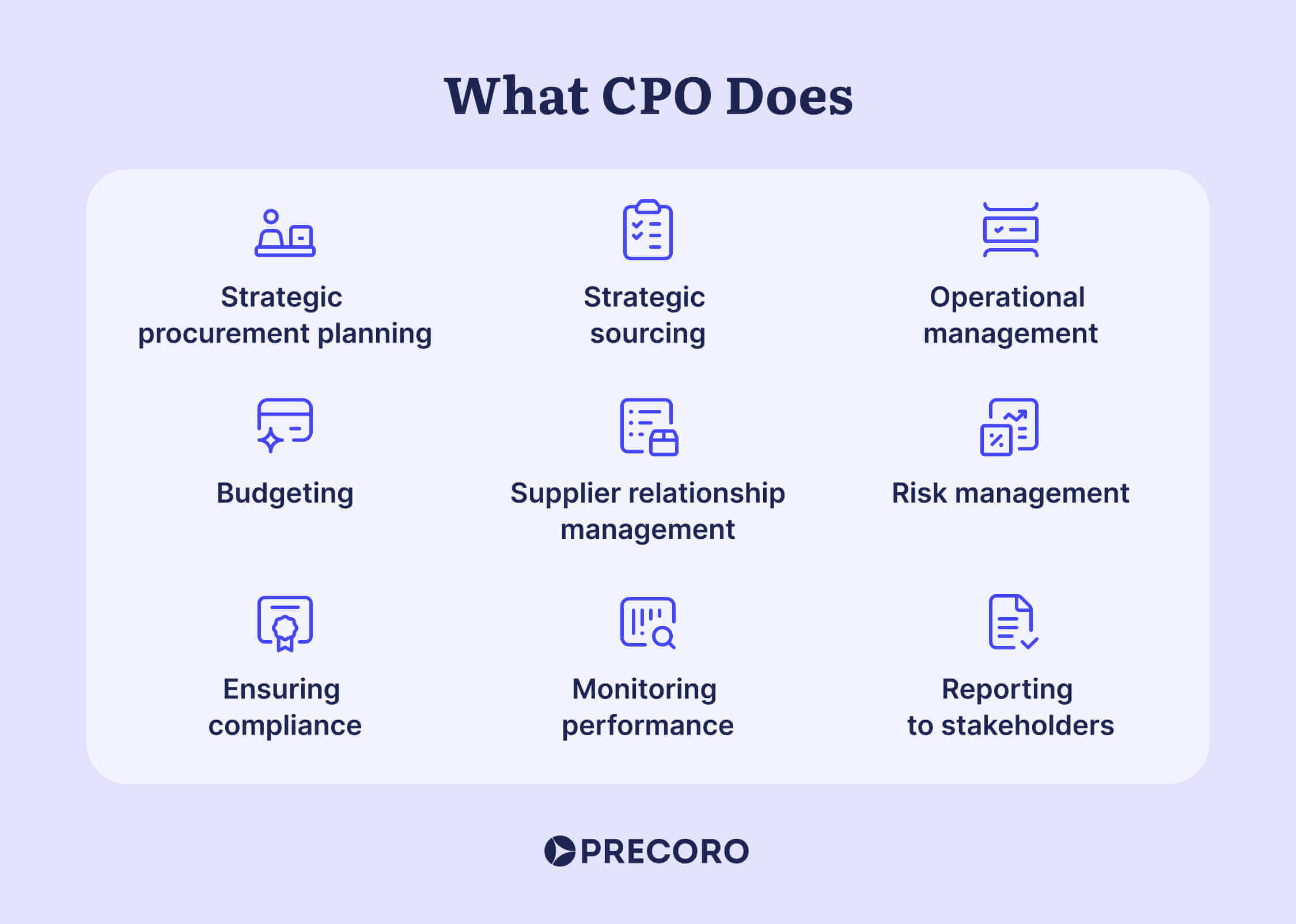
Why a Chief Procurement Officer Is Important for the Procurement Process
Over time, the role of CPO expanded from ensuring transactional efficiency of purchasing operations to focusing on long-term business value. Today, the CPO shapes the procurement process on several levels.
Ensuring Operational Efficiency
At a fundamental level, the CPO applies their expertise to organize and oversee the company’s sourcing, procurement, and supplier management activities. Their primary goal is to ensure the cost efficiency of acquisitions and get the best value for money.
The chief procurement officer assesses the company’s procurement needs and, in collaboration with department heads, puts together a list of what these departments need in order to function and successfully fulfill their tasks. These needs can include anything from smaller stationary items to large production machinery or team requalification courses. When the “what” is clear, the CPO gathers information on “when” these goods or services should be delivered or provided.
The CPO is responsible for assembling a professional team and implementing transparent workflows to ensure that orders are fulfilled accurately, on time, and in compliance with internal or external regulations. If company objectives change, the CPO has to adjust the workflows accordingly.
The chief procurement officer also overlooks the process of supplier selection. This includes evaluating and selecting vendors and suppliers through requests for proposals (RFPs) or quotations (RFQs) and sometimes also competitive bidding. The CPO can either personally join in on negotiations with supplier representatives or just approve the team’s selection as the last step. Some CPOs also choose to give their employees complete autonomy to negotiate contracting terms themselves — typically up to a specific financial threshold.
If any issues or disputes arise within the source-to-pay cycle, the CPO intervenes to resolve them. They might have to communicate with suppliers or logistic partners to smooth over potential conflicts and find a common ground. They might also need to negotiate with other external partners, such as banks, financing institutions, or contractors if either party commits misconduct or breaches the contract.
Making Tactical Decisions
On a tactical level, the chief procurement officer helps the company to stay ahead of market changes. This officer conducts market research on various occasions, either in preparation for a specific purchase or while developing a long-term procurement plan. The CPO leverages knowledge of the supply market, competition, and global political and economic tendencies to predict possible market trends and supply chain risks. This is especially important for materials that are required for production.
The CPO also develops risk mitigation strategies and ensures the business is prepared for possible negative events. At the same time, qualified CPOs can be among the first ones to recognize windows of opportunity within the company’s supply chain, such as the development of new materials or technology. As a result, the CPO can make informed procurement decisions.
Boosting Strategic Value
Finally, the role of CPOhas transformed due to the increasing complexity of procurement and its impact on business longevity. The CPO increases the total value of a business by promoting procurement sustainability, ESG (environmental, social, and governance) compliance, and adherence to ethical principles. A large part of a company’s environmental and social impact stems from the quality of its vendors and suppliers. By ensuring that the business sources from responsible vendors and suppliers, the chief procurement officer makes an extremely valuable contribution to the organization’s image and brand.
The CPO is also responsible for assembling a highly professional and value-oriented procurement team, mentoring them, and organizing training to maximize performance. When the CPO is a good leader, they foster a culture of continuous improvement and encourage learning. Supporting procurement team members in their professional growth pays off in the long run, as employees become better problem-solvers and strive to innovate, ultimately saving the company time and money.
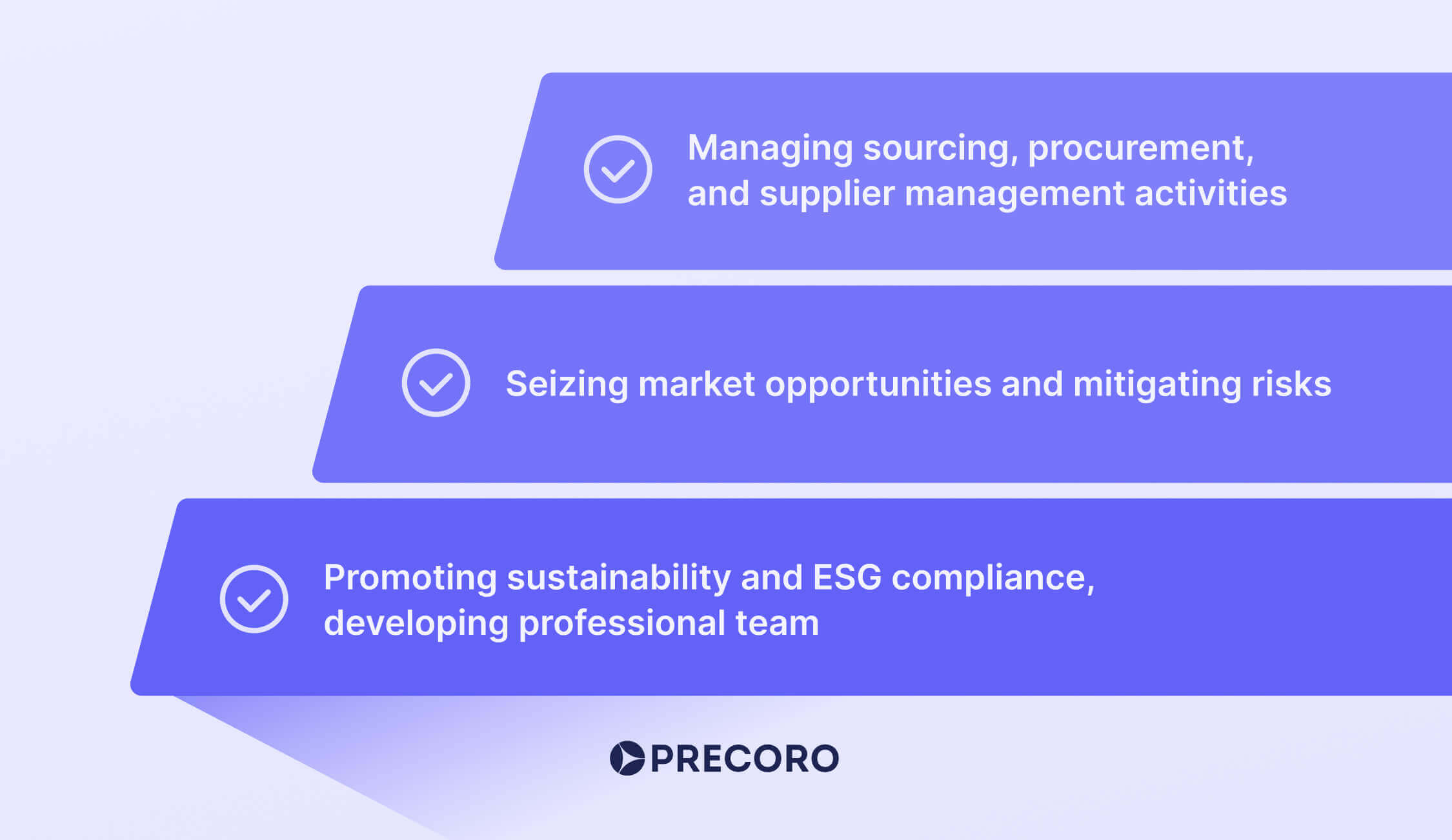
Which Companies Employ CPOs
Any organization that strives for financial efficiency – meaning any organization! – will benefit from hiring a CPO. From smaller tech companies to manufacturing giants, businesses need to acquire goods and services strategically in order not to waste their resources.
Chief procurement officers are more commonly needed by larger companies, where the number of purchases requires a separate procurement department and an executive manager to organize the procurement processes. In a complex structure of large organizations, the CPO usually answers directly to the chief executive officer (CEO). However, depending on the company structure, the CPO can answer to the chief financial officer (CFO) or chief operating officer (COO). In such companies, the CPO probably leads a procurement department with several procurement executives, purchasing officers, assistants, and other specialists.
Smaller companies might also have a CPO, but they might serve as the organization’s only procurement professional. This means they may act alone or oversee just a small team of purchasing professionals. Also, at organizations with a simpler structure and less senior roles, the position might be named differently. For instance, the CPO may instead be called the procurement director.

What Makes a Good Chief Procurement Officer
The chief procurement officer is an experienced professional, typically with at least 10 years in the field or more. The person who fills this role is usually expected to have a degree in business, finance, supply chain management, or procurement disciplines. Some organizations require only a bachelor’s degree, while others need a CPO to have a master’s degree.
The role of chief procurement officer is suitable for those who are looking for a challenge and want to make a difference in a strategic company's development. A good CPO has strong hard skills that come with experience, such as knowledge of procurement documents, procedures, and tools. Furthermore, the CPO is expected to have a set of soft skills that allows them to plan strategically and lead the team.
Let’s go over some of the key skills needed.
Strong analytical skills
The CPO needs to know how to gather and process large amounts of data, analyze it, and format it in a succinct and visually comprehensible way that is easy to share with employees and stakeholders.
Communication skills
Like any other senior executive, the CPO has to be a “people person.” Excellent communication skills are necessary to collaborate with internal stakeholders and external partners, and to ensure that everyone involved in the procurement process is aware of their role and aligned with general business objectives.
Negotiation experience
The chief procurement officer should be able to communicate requirements clearly when negotiating with external partners. Strong interpersonal skills and a good knowledge of the market are required to make a sustainable offer to prospective partners. Plus, the CPO should be well equipped with data about the company needs, possible room for variation, and market status to politely insist on terms they can accept.
Adaptability
The CPO must be flexible and prepared to adapt to any changes encountered, including, for example, shifting market conditions or evolving organizational needs. A good CPO is prepared to put aside the current roadmap, reassess the situation, and drastically change procurement practices if needed — calmly and rationally, and with an open mind to new ideas and approaches.
Strategic mindset
CPOs should be visionaries who can see the big picture and take a top-down approach by breaking long-term goals down into smaller objectives for the procurement team. The CPO needs to align procurement strategies with general business goals and ensure that short-term wins do not sabotage long-term gains.
Leadership skills
The CPO leads the whole procurement agenda of the company, and thus typically has several employees or even teams working under them. It’s absolutely crucial for a CPO to establish trustful and respectful relationships with the procurement team, if there is one. This includes fostering honest communication within the team, recognizing and maximizing employee potential, defining clear objectives for everyone in the team, and setting an example for personal growth and integrity.
Technological proficiency
Modern CPOs must be familiar with procurement technologies and be willing to learn and keep up with the digital procurement transformation. Technology has become an increasingly important factor in the source-to-pay process, so efficiency-oriented companies strive to implement e-procurement software tailored to their specific regions, for example, the USA, the UK, Australia, and South Africa.
It’s primarily the task of the CPO to evaluate available solutions on the market and choose the most fitting one for the company’s procurement. A good CPO stays abreast of tech products so they’ll know right away if there’s a tool that can be integrated into their stack to make procurement operations more efficient.
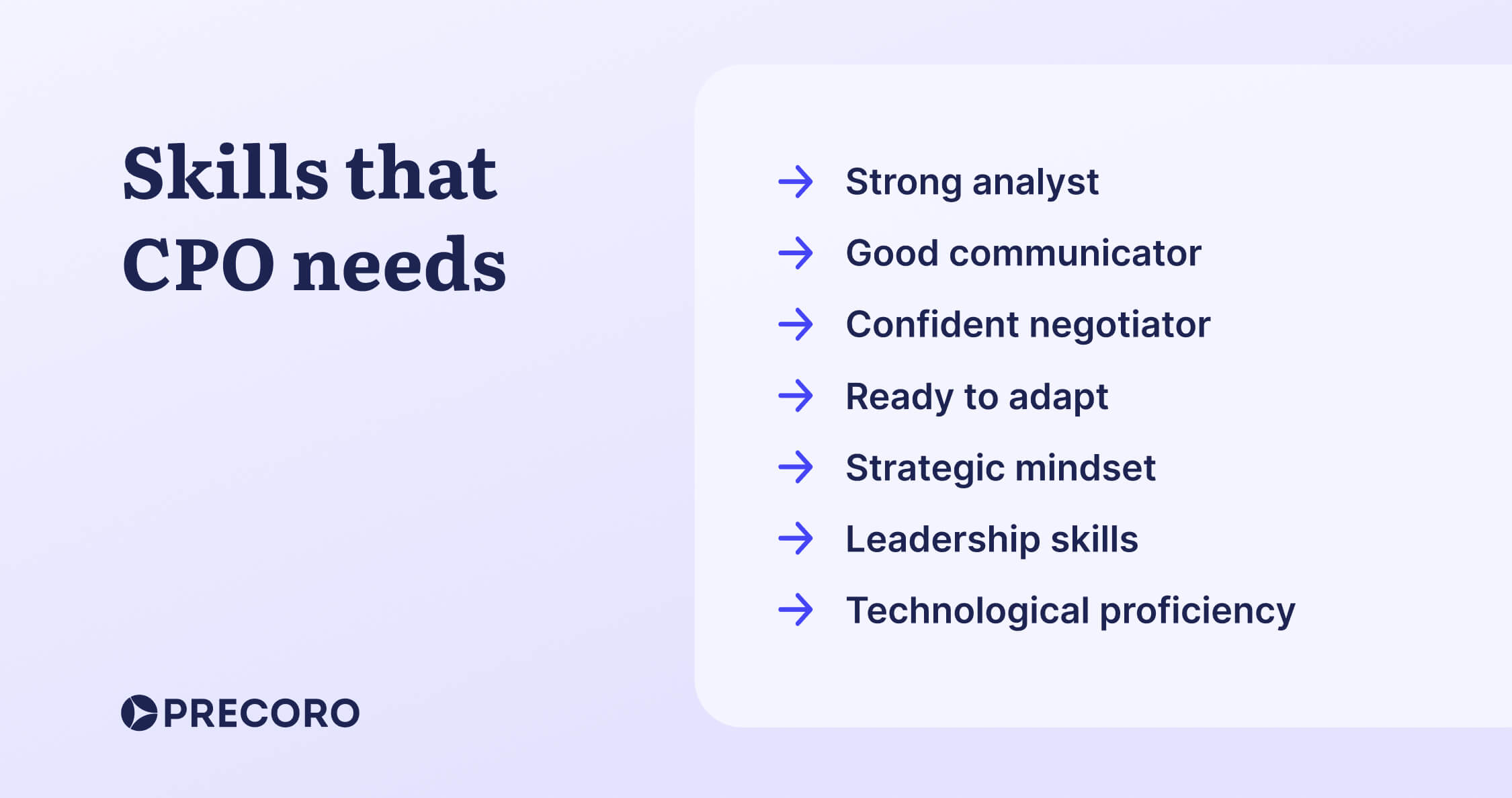
If you are on the way to becoming your company’s next CPO, consider implementing Precoro — a powerful procurement software that automates and streamlines daily tasks and provides valuable purchasing insights.

CPO in a Nutshell
A chief procurement officer is a C-suite executive who plays a pivotal role in all kinds of organizations, whether it's a construction business, renewable energy sector, hospitality, healthcare or other industries.
Through strategic procurement management, CPOs contribute to production stability and drive cost savings. By understanding the comprehensive nature of procurement and leveraging their experience, CPOs can help organizations achieve long-term sustainability, operational efficiency, and a strong competitive advantage on the market.
The role of chief procurement officer is not only about managing purchases but rather about strategic procurement planning, mitigating risks, and searching for ways to improve the source-to-pay process. CPOs with impeccable analytical skills and strong leadership can significantly contribute to the organization's long-term value. Aspiring CPOs should focus on developing hard and soft skills to stay abreast of industry trends and excel in this executive role.
FAQs
CPO stands for chief procurement officer — a senior executive responsible for developing and implementing a company’s procurement strategy, policies, and procedures.
The role of a CPO is constantly evolving as organizations become more global and new technologies emerge. In the past, chief procurement officers were responsible for negotiating contracts with suppliers and overseeing purchasing transactions. Today, CPOs also contribute to developing the long-term business strategy. The CPO ensures that the company gets everything required for operations on time and cost-efficiently.
To become a chief procurement officer, you need relevant education and experience. Bear in mind that specific requirements depend on the hiring company. Typically, a perfect candidate needs to have good soft skills such as analytical, communication, negotiation, and leadership skills. They also need to be ready to adapt to changes, have a strategic mindset, and be technologically proficient.


